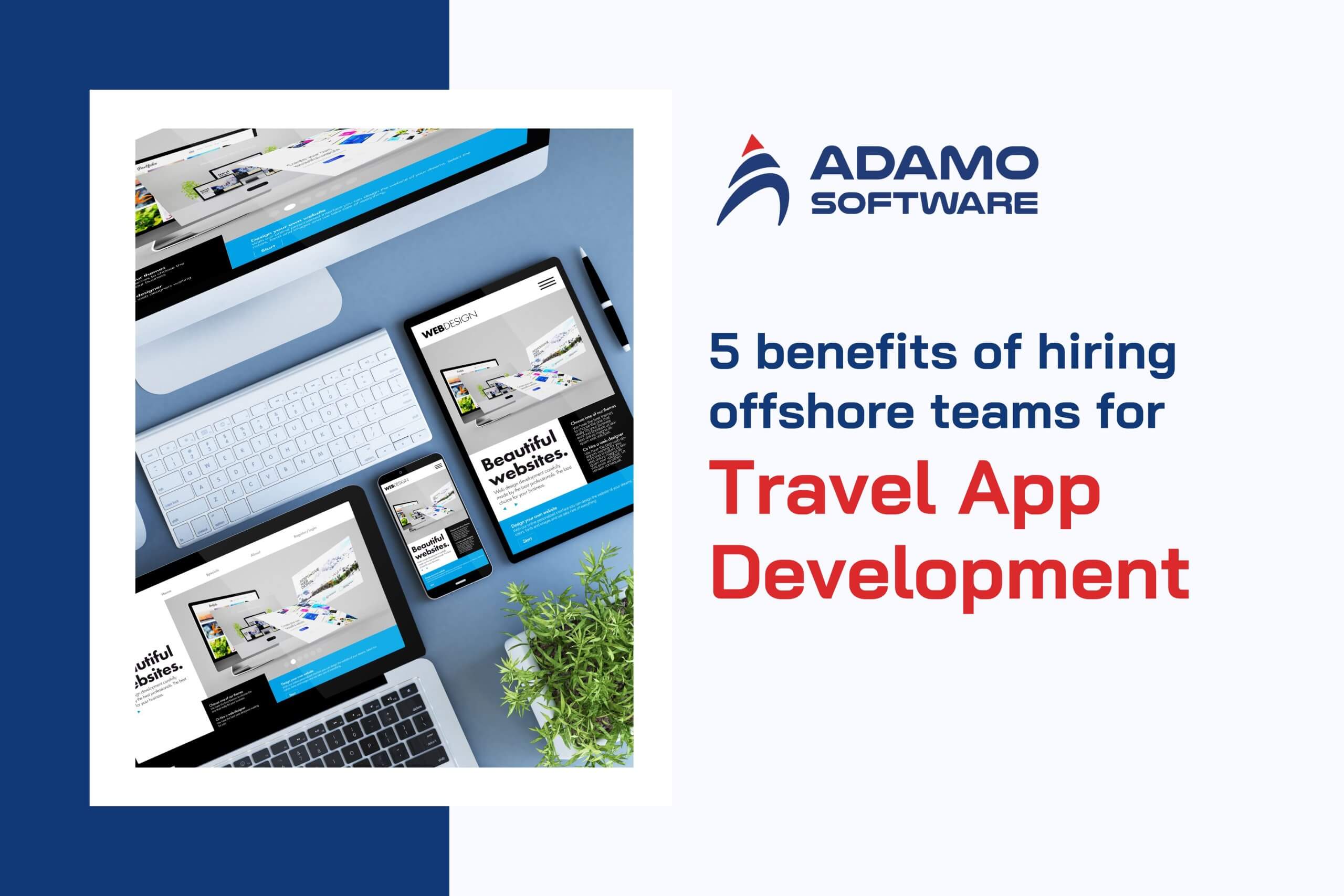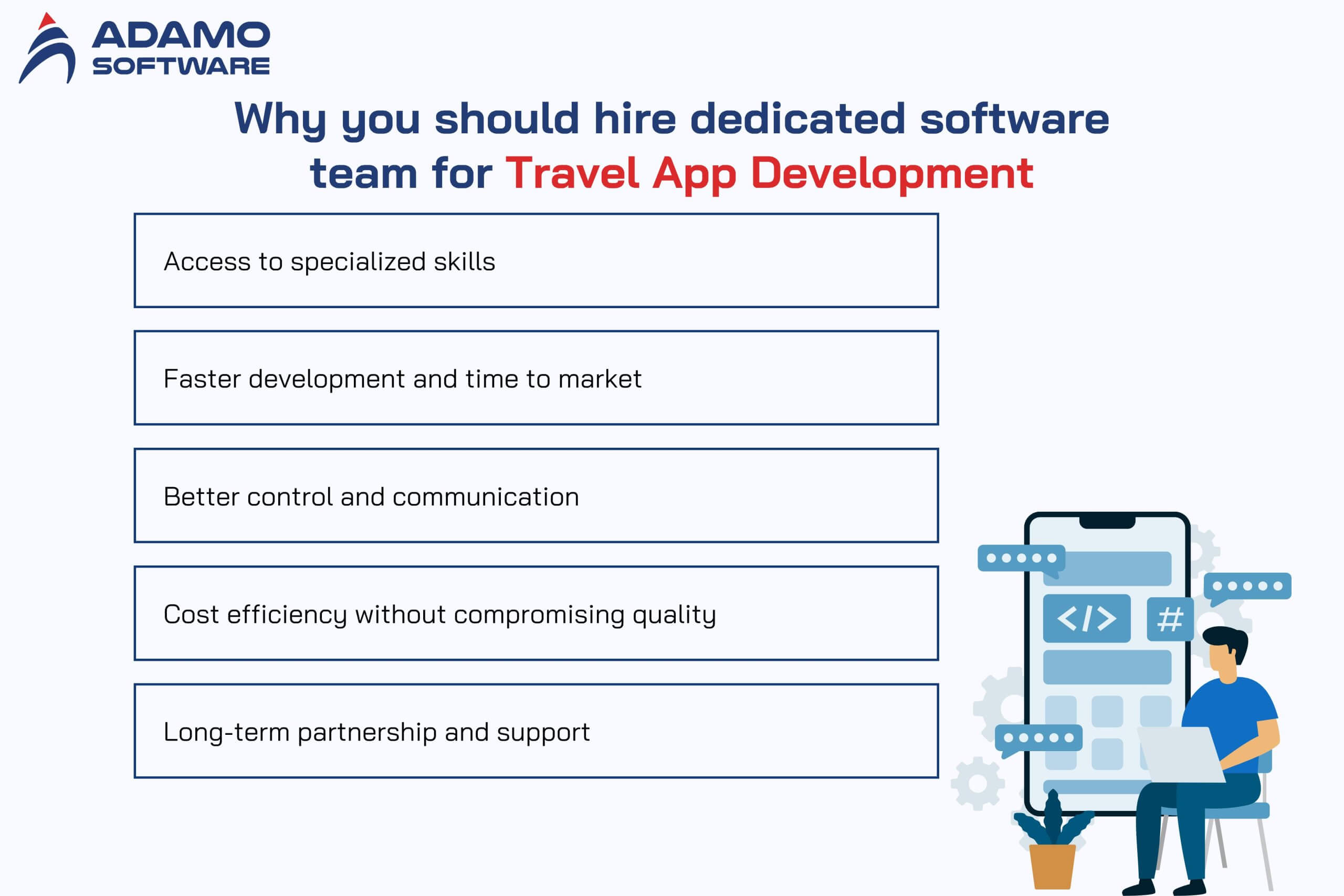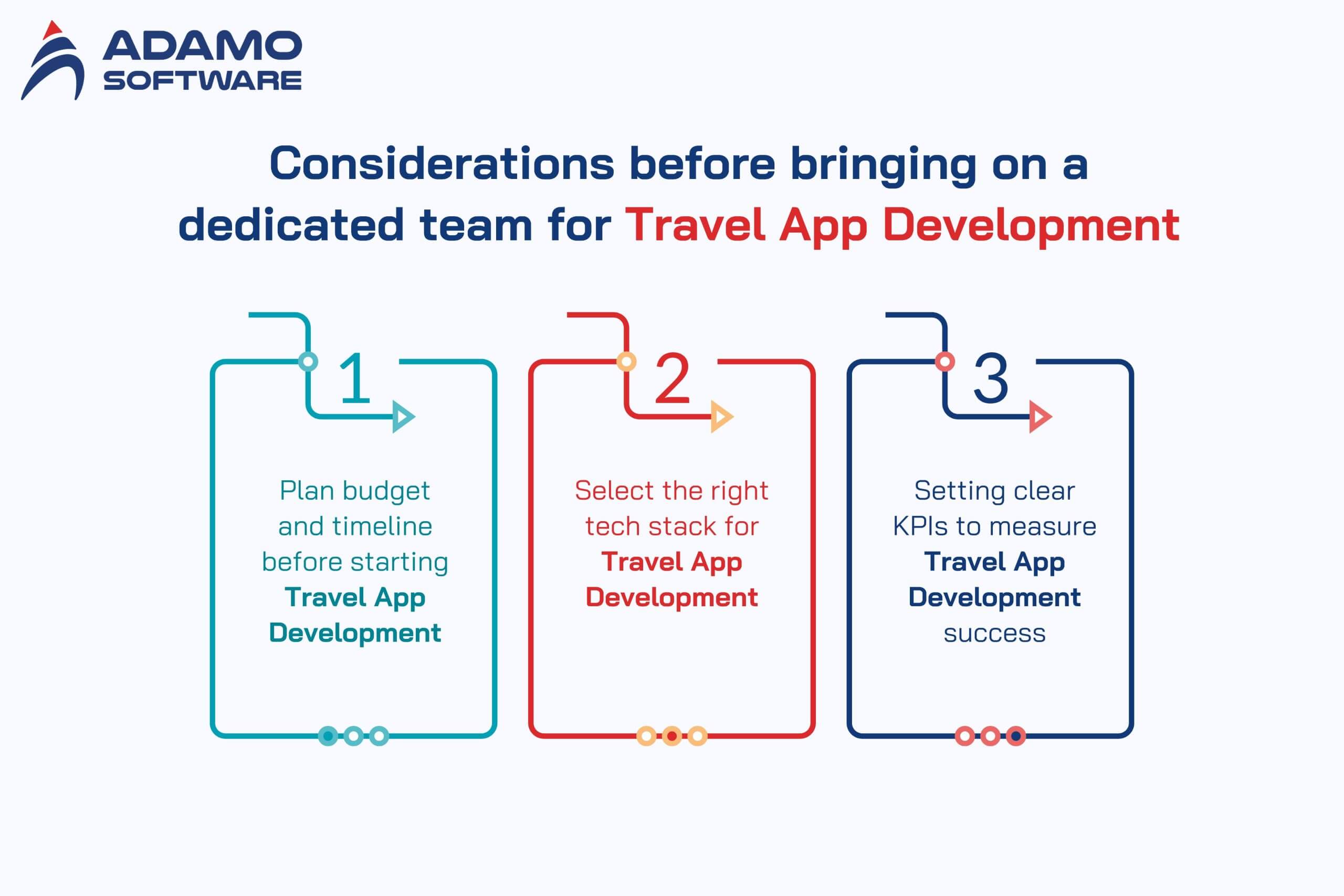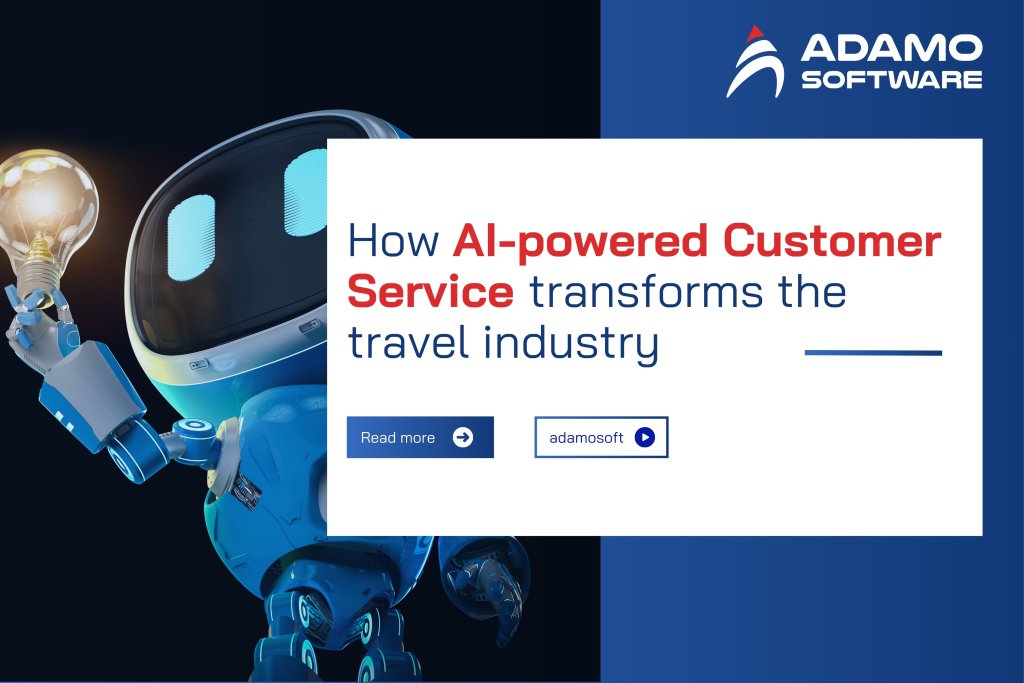5 Benefits of hiring offshore teams for Travel App Development

Traveling has become the most comfortable experience ever. People use applications to manage all stages of their lives. Travel applications enable people to book flights, get hotels, or see maps after a few touches on their devices. Therefore, the rivalry in travel app development is growing at a rapid pace. It has become one of the preferred options among a wide range of business entities.
Creating a successful app requires having the right skills and the right team. Offshore teams would be a brilliant choice since they deliver quality work, save costs, and provide flexible assistance. The article will discuss why one should consider hiring offshore teams when developing a travel application, where to find the correct developers, and how much it costs, honestly. In case you are considering creating a project in the sphere of travel app development, this guide will assist you with the initial step.
I. Why you should hire a dedicated software team for Travel App Development
The travel app development market continues to grow rapidly. This is because of the increase in individuals who book their trips through the app, locate hotels, and organize adventures. To design a reliable and good app, you must have a highly qualified team that is aware of the travel business. A dedicated software team enables you to have their undivided attention. Therefore, you will get faster outcomes while saving more money.

Access to Specialized Skills
The travel app development is not just Google coding. You require specialists in APIs to make flight and hotel bookings, GPS features, real-time correction, and an easy-to-use interface. Any dedicated software team will have experts who are professionals in the following areas. They even stick to the best practices of mobile performance, security, and scalability. These serve as the key to success in the travel industry.
Rather than generalists or freelancing, companies are better off collaborating with specialized travel app developing teams. As Statista shows, the market of travel apps that cater to the needs of consumers worldwide is projected to surpass 1.5 billion dollars by 2025. This promises high levels of demand for high-quality solutions. To be ahead of the pack, you will require a team that has decades of experience in your travel app development. Each types of travel apps: social travel apps, self-guided tour app, walking tour app,… required difference experience.
Faster Development and Time to Market
The app’s launching speed might mean either gaining some users or losing out to competitive industry players. In your travel app development, a team of developers works full-time and thus they will produce results quicker. With concise communication and clearly outlined roles, they minimize the chance of errors or misinterpretation. They also carry reusable code and tested processes, so your app will be built and deployed significantly faster.
McKinsey reminds us that agile teams are 30-50% more efficient in the speed of delivery than traditional development. This is why dedicated teams are a perfect choice if you want to enter the market quickly with the help of travel applications. The shorter the time your app takes to become live, the faster you acquire users and feedback. If you are still wondering what travel app trends to develop, check it out.
Better Control and Communication
You obtain complete visibility and control over your travel app development when you have a team working as one. You may select the manager of the project, establish the rules of communication, and the rules of reporting progress. This will enable you to keep up with every facet of the process, including planning and launch.
Healthy communication yields good results. A transparent path of work will make your team know what you want to achieve, and you can change the features of the app throughout the process. The tools, such as Slack, Jira, and Trello, have many daily updates and quick responses from offshore teams. This simplifies the process of travel app development and makes it transparent even when your team members are based in a different country.
Cost Efficiency Without Compromising Quality
Cost saving is one of the greatest arguments to employ offshore teams in travel app development. It is costly to hire local developers in the U.S, UK, or Western Europe. There are offshore teams (mainly in Asia or Eastern Europe) where the quality is identical or higher, but the rates are much cheaper. According to data from Accelerance, companies could reduce their costs by up to 60% through outsourcing.
That is, you can spend more on design, marketing, or after-launch servicing. You still have quality developers, yet you do not end up overspending. Offshore teams will give great value to your travel app development project, and you can scale intelligently.
Long-Term Partnership and Support
A committed team not only develops your app and leaves. They usually provide long-term support and upgrades. This is noteworthy since the travel app development does not just stop at realizing the launch. You will be required to eliminate bugs and build features and improve better user experience with actual feedback.
The relationship with a team of skilled employees that you establish on a long-term basis result in continuous improvement and support. This assists your travel app development to develop quality over time. It also makes your app competitive in the rapidly growing market.
Simply put, outsourcing a team of people devoted to your project will cost you less, will be more controllable, and will be completed with much greater speed. It is one of the wisest decisions you can ever make concerning travel app development. No matter whether you construct a new platform or improve a vintage one, experienced personnel can get your travel application development to a new level.
II. Where to find Travel App Developers
Firt, you need to decide when you need to develop or upgrade your travel software. In the development of travel apps, getting on the right team is an important move. You should have talented developers who are familiar with travel platforms, mobile technology, and are aware of user needs. Fortunately, the number of reliable sources and destinations where you can find the appropriate talent is huge.
To develop a high-earning travel app, you must have competent teams that know travel tech and customers. The following are good sources for finding them:
Upwork And Freelancer
Millions of freelancers are hosted on these platforms. In 2025, Upwork will already boast almost 18 million freelancers and 814 thousand active customers, who utilize its services to hire. This opens access to a great network of skilled professionals specializing in travel app development.
Clutch.co
Clutch has a list of verified development companies whose portfolios and reviews are actual. It would be perfect for locating agencies that have been proven in the development of travel apps. Ratings, case studies, and team sizes can be compared in next to no time.
Ready to Outsource?
Discover how we can transform your business with expert IT solutions.
LinkedIn provides a network of more than 214 million US members, with over 70% of its members open to working on a freelance or contract basis. Travel app developers can search according to their skills, location, and industry.
GoodFirms & Toptal
GoodFirms lists vendors according to customer reviews and achievements in projects. Toptal offers the best 3% of freelance developers. These platforms help connect you with top-tier experts in building advanced travel applications.
University Career Centers
The freshers promote new ideas and enthusiasm for learning. Approximately 65% of the tech students seek freelance or startup jobs. This induces them to make imaginative choices for travel app development.
GitHub, Stack Overflow
GitHub has more than 100 million developers and multiple open-source projects in its open repos. Stack Overflow is a place where you can scout contributors who are real problem solvers and experts in travel app development.
Using these channels, you can create a powerful and diverse team for travel app development.
III. How much does it cost to hire offshore teams for Travel App Development
When estimating the cost of travel app development, you must consider the overall expense based on the efficiency of your team. They are the hourly rate, and the number of hours required to develop a travel app. The average amount of time that a Minimum Viable Product (MVP) requires is about 400-1,000 hours, including designing, development, and testing. Suppose your offshore team costs $40/hour – then an MVP with a single platform should be between $16,000 and $40,000.
Here’s a breakdown based on that estimate:
| Stage | Hours (est.) | Cost (@$40/hr) |
| Design | 100–200 | $4,000–8,000 |
| Development | 200–500 | $8,000–20,000 |
| Testing & QA | 100–300 | $4,000–12,000 |
| Total (MVP) | 400–1,000 | $16,000–40,000 |
These quotes are related to developing a travel app on one platform (iOS or Android). Depending on your interest in having both platforms, it will cost you twice, meaning it will cost $32,000 to 80,000. Instead, you can save on cross-platform tooling as long as you select, e.g., Flutter, so that you can develop your app once and deploy it across iOS and Android.
Referring to the pricing provided, it is necessary to remember that this pricing is applicable to an MVP. Simple additions such as augmented reality, complex booking systems, or AI-based recommendations can cost a lot of hours and overall money.
GoodFirms in 2024 reported that the typical offshore development rates are between $30 to $60 per hour, depending on location and skill level. Codementor estimated that the median time for an MVP in the app market in 2024 is between 600 to 800 hours across mobile platforms.
Overall, the cost of basic development of the one-platform minimum viable product is predicted at such a range as 16 000-40 000 dollars. That of the complete work of the travel application development with all its functionality and two platforms at 30 000-80 000 dollars based on the peculiarities and skills of the developers.
IV. Crucial considerations before bringing on a dedicated team for travel app development
Finding the right personnel to work with on the travel app development involves more than simply a resume review. It requires a strategic checklist to enable you to assess the technical fit, align expectations, and remove threats. The following section will help you take crucial steps.

1. Plan budget and timeline before starting Travel App Development
The crucial thing to do ahead of employing a team of travel app developers is to define a budget and timeline. Projects are usually hit by unexpectedly high costs without some open financial boundaries. A 2025 report from the Standish Group shows that 67% of the software plans are over budget. To prevent this, draw a clear total budget in advance. This must be able to encompass the entire process of development, project management, testing, and maintenance post-launch. There is also a suggestion by the experts to add 10-20% slack to cover any unexpected expenses.
Time schedules are not less important. About 40% of software projects are delayed (McKinsey), frequently as a side effect of bad planning. Divide your project into manageable working stages, with defined milestones, and leave some space for flexibility. One can accelerate delivery using Agile techniques by providing quicker feedback and iteration. Also, indicate the potential blockers in the early stages so as to avoid bottlenecks. Studies indicate that proper planning using well-planned budgets and schedules makes a project 30% successful. In dealing with offshore teams, ensure that your schedule and budget are periodically reviewed. This open-mindedness will keep the travel app development process on track and point to your business objectives.
2. Select the right tech stack for Travel App Development
Selecting an appropriate technology stack is one of the important steps in travel app development. The proper tools enhance performance, assure scalability, and promote efficient user experiences. Every tech stack component you use should correspond with your business and technical requirements, including backend and UI. A list of popular technologies applied in travel app development, advantages, and the latest industry figures (2025-2026) is described in the table below:
| Technology | Advantages | Industry Statistics |
| Node.js | High throughput, lightweight | 49.2% developer preference |
| MariaDB | Reliability, high performance | Query performance improvement up to 80% %2 |
| React | Fast UI rendering, component-based | 35% developer usage |
| RESTful APIs | Simplified third-party integrations | 20% increase in usage |
3. Setting clear KPIs to measure Travel App Development success
In contracting an offshore team that would be involved in developing a travel app, it is advisable to outline KPIs (Key Performance Indicators) that can be measured to gauge the performance. These symptoms will guide you in checking whether the construction is getting on the right track and achieving business objectives. Technical metrics and user-side metrics will allow you to correct strategies early enough, thus eliminating waste in terms of delays and losses incurred. The following table contains key KPIs you should observe in the process of travel app development, as well as after:
| KPI Category | Recommended Metric | Why It Matters |
| User Engagement | DAU / MAU growth (+20% quarterly) | Helps measure user retention and app relevance |
| User Satisfaction | CSAT & NPS (target +5 NPS points) | Higher NPS correlates with a 25% to 100% revenue increase |
| System Performance | Load time < 2 sec, Uptime 99.9% | 87% of users may abandon apps with poor performance |
| Financial Metrics | CLV: CAC ratio > 3:1 | Shows long-term profitability and return on user acquisition |
| Conversion & Reach | Install-to-signup rate, retention rate at 30/60 days | Reveals how well the trip app turns sightseers into active members |
The success of travel apps means more than the launch of the product and requires monitoring their real-time performance. Ensure your development partner is familiar with such KPIs and implements the tracking tools to constantly check these KPIs. Besides increasing efficiency, this will result in smarter business decisions.
Choosing a qualified offshore team may provide a sturdy head start to your travel app development. When you take this checklist, you will minimize the possibility of obstructor and plan accordingly. This means that you will have control over your budget. You will hire a united team that shares your vision in the long run. The performance of an app has a lot to do with a smoother and easier path in development due to a well-established hiring process.
V. Final thoughts
Offshore hiring can add actual value to your work on travel application development. The correct team would save you money, deliver faster, and get the best global tech talent without compromising quality. The concept is to set evident goals, plan smartly, and pick the right partners to make a difference.

At Adamo Software, we custom travel app development. We are a development firm based in Vietnam that provides experienced teams, versatile models, and profound experience in travel platform development. We are ready to make your company flourish using credible digital insights.
FAQs
1. What are the benefits of working with skilled developers for travel app development projects?
When you employ high-end developers to develop travel applications, you are guaranteed a travel app that will be developed in terms of quality, scalability, and performance over the long-standing application of the developed software. Senior specialists know how to combine all the specificities of the travel industry: booking systems, payment gateways, geolocation services, and third-party APIs (e.g., Amadeus or Skyscanner). They also prevent some pitfalls, such as delays in performance or security exposures, which will damage user confidence.
An adept team will provide their industry experience, Agile methodology, and technology experience. This will make your app travel grow optimally instead of being a mere useful travel application. Statista conducted a study in 2024, stating that 80% of travel application users uninstall their applications after one instance of use if it was a bad experience. Building a sound team is an effective way to guarantee user retention and satisfaction.
2. How long does it take to create a custom travel booking app?
The cycle of travel app development projects varies upon multiple aspects such as convenience, necessity, stage of aggregation, environment (iOS/Android), and design specifications. The timeline typically varies between 3 and 6 months, depending on the type of basic MVP (Minimum Viable Product), including user registration, search, and bookings.
Depending on whether you want to add more features to your project, say, real-time flight tracking, itinerary planners, reviews, and AR-powered travel guides, it can take 6 to 12 months or even more. Agile teams have the possibility of delivering projects in phases and thus receiving early feedback on their projects as well as quick iterations. Trustworthy offshore developers also accelerate delivery, as there is a team of committed resources spread across different time zones.
3. Why choose Adamo Software for your travel app development needs?
Travel app development should be entrusted to a reliable partner, and Adamo Software is an experienced supplier that has a successful history of developing high-powered travel and hospitality solutions to its global clients. A feature that the company can boast of is its effective offshore development model. It is cost-effective and reliable in quality. Clients have access to a professional pool of developers and designers as well as QA experts who have practical experience in today’s apps, scalable, secure, and rich in features.
We also take pride in Agile delivery, open communication, and a fondness for long-term partnership. Therefore, we are both favored by startups and large enterprises. Adamo Software helps businesses accelerate their development cycles and provides the business with a tech partner who is well-informed about the travel industry.





